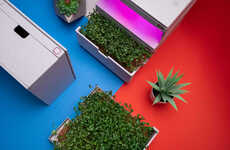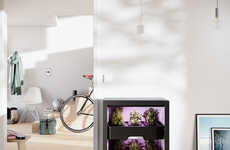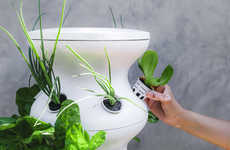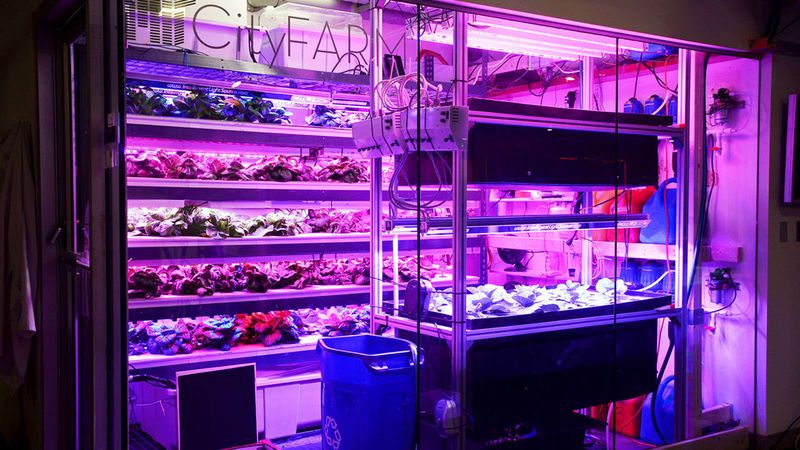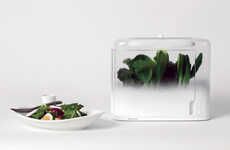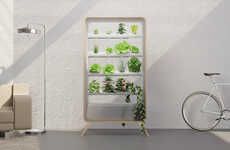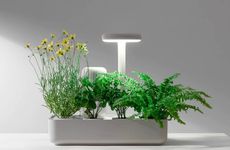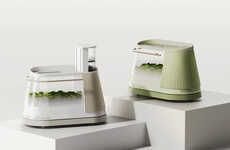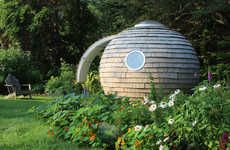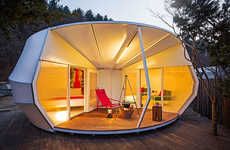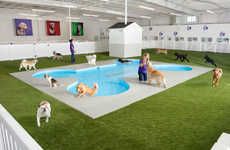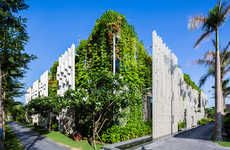
This Soil-Free Farm is Small Enough to Fit on Top of a Desk
Katherine Pendrill — July 4, 2015 — Eco
References: mitcityfarm.media.mit.edu & fastcoexist
Caleb Harper has created a desktop-sized box, which houses a miniature soil-free farm. Designed to grown vegetables anywhere in the world, the 'Personal Food Computer' functions as a self-sustaining aeroponic system.
The soil-free farm operates by creating its own weather, which mists the plants inside with water and supplies nutrients to their roots. The tiny farm adjusts the conditions in the box according to a series of smart monitors that track important data about the CO2 concentration, light levels and the humidity. Because it is self-sustaining, the aeroponic system can grow vegetables in any conditions.
What is most innovative about the Personal Food Computer is that it provides all the infrastructure necessary to grow fresh food. Water, power and transportation are all taken care of, meaning this system can be used to grow food nearly anywhere in the world.
The soil-free farm operates by creating its own weather, which mists the plants inside with water and supplies nutrients to their roots. The tiny farm adjusts the conditions in the box according to a series of smart monitors that track important data about the CO2 concentration, light levels and the humidity. Because it is self-sustaining, the aeroponic system can grow vegetables in any conditions.
What is most innovative about the Personal Food Computer is that it provides all the infrastructure necessary to grow fresh food. Water, power and transportation are all taken care of, meaning this system can be used to grow food nearly anywhere in the world.
Trend Themes
1. Soil-free Farming - Diverse applications for soil-free farming technologies, such as desktop aeroponic gardens, are emerging in urban agriculture and indoor farming.
2. Self-sustaining Systems - Opportunities for self-sustaining systems, like the Personal Food Computer, can disrupt traditional farming practices by providing the infrastructure necessary for growing fresh food.
3. Smart Monitoring - Incorporating smart monitors into agricultural systems can optimize plant growth and productivity, opening up possibilities for efficient and automated farming processes.
Industry Implications
1. Urban Agriculture - Desktop aeroponic gardens contribute to the sustainability and accessibility of urban agriculture, enabling urban residents to grow their own fresh produce.
2. Indoor Farming - Desktop aeroponic gardens offer a compact and efficient solution for indoor farming, maximizing space utilization and reducing reliance on traditional agriculture.
3. Smart Farming - Smart monitoring technologies in systems like the Personal Food Computer can revolutionize the agriculture industry, optimizing resource usage and improving crop yields.
4.6
Score
Popularity
Activity
Freshness

